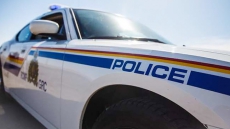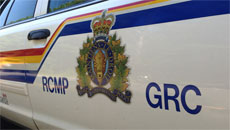VANCOUVER — Misunderstandings, uncertainty and technical difficulties slowed the emergency response to a toxic fuel spill in Vancouver's English Bay by nearly two hours, a review has found.
The review released Friday also found that Canadian Coast Guard staff were unsure of their roles and a faulty provincial alert system meant the city was not notified until 12 hours later.
"The MV Marathassa incident was an operational discharge of a persistent fuel oil with high consequences," said report author John Butler.
"The response was delayed by one hour and 49 minutes due to confusion of roles and responsibilities, miscommunications and technology issues."
The report was commissioned by the coast guard after a malfunction on the grain carrier MV Marathassa caused about 2,700 litres of bunker fuel to spill into the bay on April 8.
Butler, a former coast guard assistant commissioner, conducted the review and made 25 recommendations on how future marine spills could be handled differently.
He detailed a string of misunderstandings between the coast guard, Port Metro Vancouver and the organization tasked with cleanup, the Western Canada Marine Response Corporation.
A passing sailboat first reported the spill at 4:48 p.m. Soon after, port officials contacted the coast guard, which gave a "heads up" to the response corporation at 6:08 p.m., said Butler.
But the coast guard did not officially activate the corporation until 7:57 p.m., meaning cleanup was delayed by one hour and 49 minutes, according to Butler.
The delay appears to have stemmed from a conversation between Port Metro Vancouver and the response corporation at 7 p.m. Port officials said they couldn't see the original oil patch and were collecting a sample kit.

"The response organization incorrectly believed that the Port Metro vessel was standing down," Butler said at a news conference. "This information was then communicated to the coast guard, leading to a de-escalation of the event."
Thirty minutes later, port officials received additional air surveillance photos that clearly showed the significance of the spill. But due to difficulties in connecting with the coast guard via cellphone and computer, the photos weren't shared until 7:55 p.m.
As soon as coast guard staff saw the photos, they alerted the response corporation, he said.
The coast guard lacked the capacity to respond because many workers were just demobilizing from an operation in the Grenville Channel at the time. Butler called for the agency to ensure it always has enough staff to respond to a major marine-pollution incident.
Butler's report also revealed that front-line coast guard staff were not aware of a long-standing agreement with Port Metro Vancouver that clearly sets out responsibilities. He blamed high turnover and poor training for the oversight.
Coast guard commissioner Jody Thomas told the news conference that the agency was taking action on all of Butler's recommendations.
"We know we must prevent such a delay from recurring. A critical piece to addressing the delay is clearly in the area of communications," she said.
Further, Butler said denial by the owners of the MV Marathassa that the vessel was leaking fuel delayed recognition of the spill's magnitude.
Alassia NewShips Management, which operates the Greece-registered ship, said that it will be reviewing the report fully and it remains focused on cleanup and response.
An investigation by Transport Canada into the cause of the leak is still underway.
Butler's report also said the absence of officials from Environment Canada affected the response.
"Environment Canada's on-site leadership in providing sound, independent scientific and environmental advice would have been greatly beneficial to this incident," the report stated.
Butler also said it was the province's job to notify the city during a significant spill. But because the severity of the spill was initially unclear, it was given a low level in the province's coding system.
B.C. Environment Minister Mary Polak said in a release that the review is a very good first step towards ensuring the coast is better protected.
"We are on the right path, but we also recognize there is still much more work to do towards achieving the sort of marine spill response capabilities we can be truly proud of," she said.
Fisheries Minister Gail Shea said she has directed the coast guard and other federal partners to act swiftly on all the recommendations and some are already being implemented.

"The polluter-pay principle means that the polluting vessel is responsible for the costs of cleaning up the mess they left in English Bay," Shea said in a news release. "Our government will aggressively pursue compensation."




